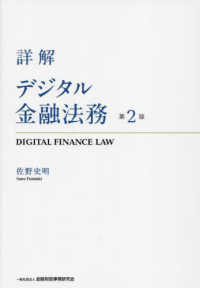- ホーム
- > 洋書
- > 英文書
- > Literary Criticism
Full Description
This book offers a discussion of seven "canonical" novels by Ian McEwan (The Cement Garden, The Comfort of Strangers, The Child in Time, The Innocent, Black Dogs, Atonement, On Chesil Beach), introducing radical new readings, which are offered not as ultimate and conclusive "solutions" of the textual puzzles, but as possibilities to engage with the text creatively, to enrich the critical consensus and restore interpretative freedom to the readers.
This project formulates a strategy of "inclusive reading" - an approach to the text that does not seek to reduce it to a single interpretation, and yet is comprehensively informed through the analysis of the primary text, critical discussion, authorial comments and the context of the composition. Each reading demonstrates the metafictional structure of the texts, indicating that McEwan's works may be treated as invitations to roam within their worlds, examining the multiple frames of their structure and the meanings generated thereby. All the chapters attend to submerged, repressed, or deliberately masked voices. The Cement Garden is seen as a multi-layered dream, with a shifting hierarchy of dreamers; The Comfort of Strangers is viewed as an inverted metafiction, with insubstantial characters corrupting more complex heroes; The Child in Time is read as Stephen's book written for his dead daughter; The Innocent as a memory narrative of Leonard who refuses to notice Maria's role as a spy. In Black Dogs the over-exposure of unreliability is studied as a screen for personal trauma; in the analysis of Atonement Briony's claim to authorship is questioned and Cecilia is suggested as an alternative narrative agent.
Finally, examining On Chesil Beach, both characters' voices are reconstructed in search of the superior narrative power, which in the end is seen to be elusive, as the text seeks to undermine the hierarchy of voices.
Contents
Contents
Acknowledgements
Introduction
The author
The text: informed misreadings
The context
Critical approaches
Exemplifying the method: the early short stories
Exhibit 1: "Homemade" - reading silence, reading against irony
Exhibit 2: "Solid Geometry" - a story of deconstruction
Exhibit 3: "Butterflies" - a story of the reader's entrapment
Exhibit 4: "Reflections of a Kept Ape" - metafiction par excellence
I. Inverting Reality in Fiction: The Cement Garden
A dream within a dream
Liminal nightmares
Voices, visions, delusions
II. Inverting Metafiction: The Comfort of Strangers
The oneiric city
Intimate strangers, monstrous doubles
The villains
The victims
The carnivorous city
Inverted metafiction
III. Inverting Time: The Child in Time
Dystopia now
The voice and the eye
The time machine
The clock and The Bell
The forking paths: the conception scene
Frames: the abduction scene
The child in language
The double: Charles Darke's case
Enchanted time: the other girl
IV. Inverting Story: The Innocent
The unwritten novel: first ideas
Narration: the phantom frame
Levels of clearance
The city of spies
Innocence
V. Inverting History: Black Dogs
The words of a dead (wo)man are modified in the guts of the living
The shadow line
"I cannot quite remember"
Postmemory and post-witnesses
VI. Inverting the Authors: Atonement
Postmodernism with a moral
Drafts and versions
The puzzle of the letters, the puzzle of the dates
The hidden "author"
VII. (Mis)Reading against Misreadings: On Chesil Beach
Nostalgic memory
Metamorphoses: music, writing and shared memory - "Theft"
Arrested development
The (m)Elodie of memory
Concluding Thoughts
Enduring Love: writing letters to oneself
Amsterdam: "he alone would make the speech"
Saturday: metafiction as (un)seeing through another's eyes
Solar: unwriting the hero
Sweet Tooth: metafiction as a spy game
The Children Act: unnatural narration
Nutshell: unnatural narrator in a metafictional Hamlet
Machines like Me: sleeping with the enemy
Lessons: auto-bi(bli)ography
References
Index






